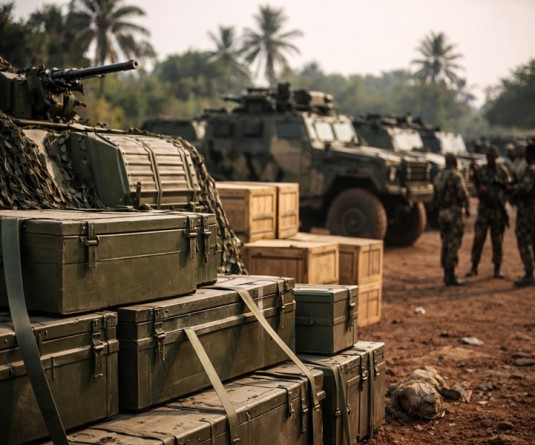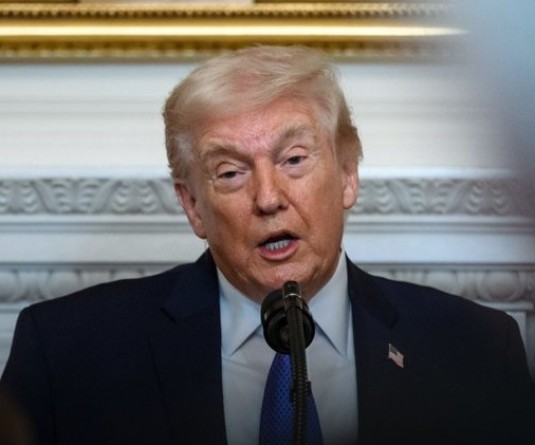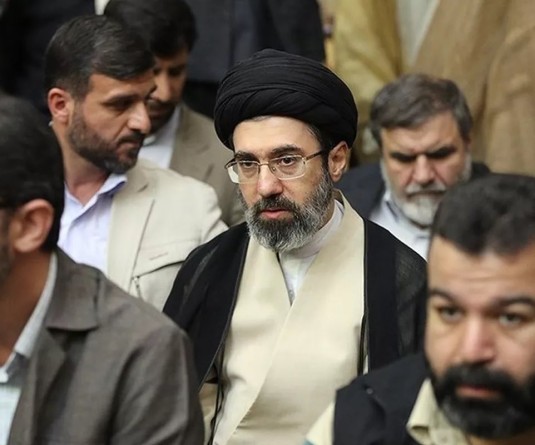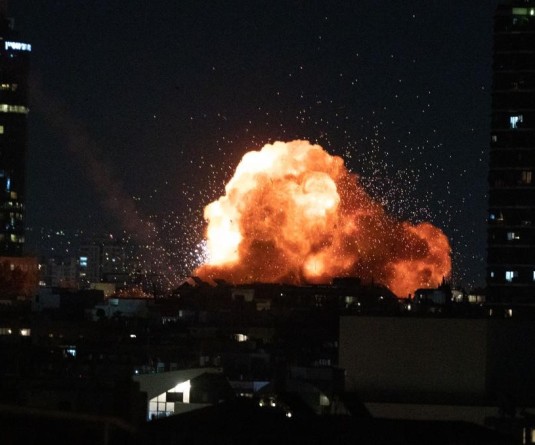
Cairo, February 5 (NYT): President Hosni Mubarak appeared increasingly isolated on Saturday, with protests entering their 12th day and the Obama administration and some members of the Egyptian military and civilian elite pursuing plans to nudge him from power.
The country's newly named vice president, Omar Suleiman, and other top military leaders were discussing steps to limit Mr. Mubarak's decision-making authority and possibly remove him from the presidential palace in Cairo -- though not to strip him of his presidency immediately, Egyptian and American officials said. A transitional government headed by Mr. Suleiman would then negotiate with opposition figures to amend Egypt's Constitution and begin a process of democratic changes.
On Saturday, thousands of people re-assembled in Cairo's Tahrir Square after a huge and jubilant protest rally on Friday by anti-Mubarak demonstrators who have made the vast, central plaza the rallying-ground and the emblem of their campaign. Soldiers at the entrance seemed to have reinforced security checks, forcing demonstrators to pass through in single file. The military also appeared to have shrunk the area available to protesters, particularly close to the Egyptian Museum.
There were indications that, alongside the authorities' avowed readiness to break with their autocratic past and talk to the fractured opposition, more traditional efforts to stifle unwelcome voices remained. After days of harassment of reporters, Al Jazeera, the Doha-based satellite broadcaster, said Egyptian authorities had arrested its bureau chief and one of its journalists in Cairo a day after it said its offices in Cairo had been torched.
Since the protests began, Egypt has been paralyzed with banks and businesses closed. On Saturday, apparently seeking to display authority and seize the initiative, Mr. Mubarak summoned the most senior economy officials - including ministers responsible for oil and finances -- to a palace far from the crowds in Tahrir Square to discuss a crisis that has cost the country $3.1 billion, The Associated Press reported.
It was not immediately how much that crisis would affected by a huge explosion early on Saturday in a pipeline in northern Sinai carrying natural gas to Israel and Jordan. There was no immediate suggestion of a link between the protests and the explosion, which sent a huge plume of orange and yellow flame into the early morning air, visible for miles around. Despite assertions on state television that the pipeline had been sabotaged, interior ministry officials said the cause of the blast was not clear.
On Friday, administration officials said that among the political ideas that had been discussed were suggesting to Mr. Mubarak that he move to his home at Sharm el Sheik, the seaside resort, or that he embark on one of his annual medical leaves to Germany for an extended checkup. Such steps would provide him with a graceful exit and effectively remove him as the central political player, going partway toward addressing a central demand of protesters on the streets of Cairo.
Mr. Suleiman and top military officers are being encouraged to have detailed discussions with opposition groups, conversations that would ultimately include how to open up the political system, establish term limits for the president and enshrine some key democratic principles ahead of elections scheduled for September.
"None of this can happen if Mubarak is at the center of the process," said one senior administration official. "But it doesn't necessarily require the president to leave office right now."
But administration officials remain concerned that removing Mr. Mubarak too early could create constitutional problems that would establish a political void. Under the existing Constitution, the speaker of the Parliament would take power, at least in name, if Mr. Mubarak resigned.
Apparently echoing Washington's assessment, Chancellor Angela Merkel of Germany told a security conference in Munich, Germany, on Saturday that early elections would not be helpful, reflecting fears among European leaders of a power vacuum. "Early elections at the beginning of the democratization process is probably the wrong approach," she said, according to Reuters.
The country's newly named vice president, Omar Suleiman, and other top military leaders were discussing steps to limit Mr. Mubarak's decision-making authority and possibly remove him from the presidential palace in Cairo -- though not to strip him of his presidency immediately, Egyptian and American officials said. A transitional government headed by Mr. Suleiman would then negotiate with opposition figures to amend Egypt's Constitution and begin a process of democratic changes.
On Saturday, thousands of people re-assembled in Cairo's Tahrir Square after a huge and jubilant protest rally on Friday by anti-Mubarak demonstrators who have made the vast, central plaza the rallying-ground and the emblem of their campaign. Soldiers at the entrance seemed to have reinforced security checks, forcing demonstrators to pass through in single file. The military also appeared to have shrunk the area available to protesters, particularly close to the Egyptian Museum.
There were indications that, alongside the authorities' avowed readiness to break with their autocratic past and talk to the fractured opposition, more traditional efforts to stifle unwelcome voices remained. After days of harassment of reporters, Al Jazeera, the Doha-based satellite broadcaster, said Egyptian authorities had arrested its bureau chief and one of its journalists in Cairo a day after it said its offices in Cairo had been torched.
Since the protests began, Egypt has been paralyzed with banks and businesses closed. On Saturday, apparently seeking to display authority and seize the initiative, Mr. Mubarak summoned the most senior economy officials - including ministers responsible for oil and finances -- to a palace far from the crowds in Tahrir Square to discuss a crisis that has cost the country $3.1 billion, The Associated Press reported.
It was not immediately how much that crisis would affected by a huge explosion early on Saturday in a pipeline in northern Sinai carrying natural gas to Israel and Jordan. There was no immediate suggestion of a link between the protests and the explosion, which sent a huge plume of orange and yellow flame into the early morning air, visible for miles around. Despite assertions on state television that the pipeline had been sabotaged, interior ministry officials said the cause of the blast was not clear.
On Friday, administration officials said that among the political ideas that had been discussed were suggesting to Mr. Mubarak that he move to his home at Sharm el Sheik, the seaside resort, or that he embark on one of his annual medical leaves to Germany for an extended checkup. Such steps would provide him with a graceful exit and effectively remove him as the central political player, going partway toward addressing a central demand of protesters on the streets of Cairo.
Mr. Suleiman and top military officers are being encouraged to have detailed discussions with opposition groups, conversations that would ultimately include how to open up the political system, establish term limits for the president and enshrine some key democratic principles ahead of elections scheduled for September.
"None of this can happen if Mubarak is at the center of the process," said one senior administration official. "But it doesn't necessarily require the president to leave office right now."
But administration officials remain concerned that removing Mr. Mubarak too early could create constitutional problems that would establish a political void. Under the existing Constitution, the speaker of the Parliament would take power, at least in name, if Mr. Mubarak resigned.
Apparently echoing Washington's assessment, Chancellor Angela Merkel of Germany told a security conference in Munich, Germany, on Saturday that early elections would not be helpful, reflecting fears among European leaders of a power vacuum. "Early elections at the beginning of the democratization process is probably the wrong approach," she said, according to Reuters.






